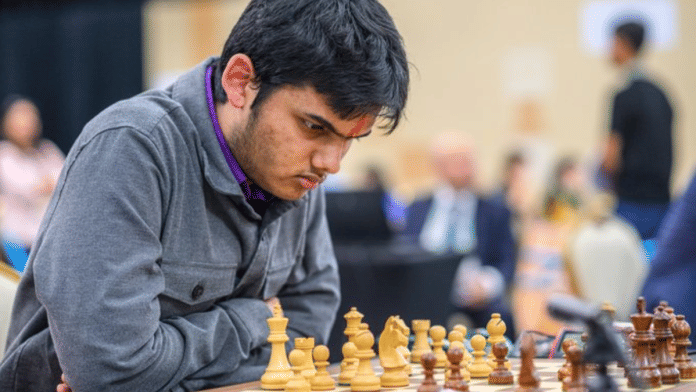New Delhi: For most teenagers, just the idea of sitting across the board from chess world champion D. Gukesh would send shivers down their spine.
But not Abhimanyu Mishra, the 16-year-old American chess prodigy who entered the room at the Grand Swiss in Uzbekistan on Monday with poise and a quiet self-confidence that seemed to bring an eerie stillness with it.
Mishra then went on to make history by becoming the youngest ever to defeat a reigning world champion in classical chess, outplaying Gukesh in 61 moves during their Round 5 encounter at the Grand Swiss.
Gukesh had built a timeless legacy as the youngest to win the World Chess Championship by 18 in December 2024, defeating Ding Liren of China in Singapore. He was also the youngest-ever FIDE Candidates winner last year at 17.
Ironically, Gukesh got to taste his own medicine as Mishra etched a historic win over the chess world champion, eclipsing a 33-year-old record held by compatriot Grandmaster (GM) Gata Kamsky, who at 17 had stunned Garry Kasparov in Dortmund.
While Gukesh, as the reigning world champion, is assured a spot at the 2026 Candidates, he chose to compete in the Grand Swiss, a tournament that offers direct spots to FIDE Candidates, to test himself and hone his form.
Instead, the tournament delivered him a sobering lesson. Playing with black, the 19-year-old faltered with a misjudged pawn push to g4 on move 12—a slip that left him fighting for survival almost immediately.
Mishra, calm and precise, never let the advantage slip, converting it into a result that will be spoken of for years.
All eyes on Abhimanyu Mishra! ?
The youngster surprisingly took down the World Champion Gukesh D in Round 5 of the #FIDEGrandSwiss pic.twitter.com/CoSzKG2JoA
— International Chess Federation (@FIDE_chess) September 8, 2025
The clash drew widespread attention inside the hall. As many as 16 GMs—from Ian Nepomniachtchi and Vasyl Ivanchuk to Kateryna Lagno—were seen pausing their own games to follow the drama unfolding at the board.
By the 20th move, Gukesh appeared to have engineered one of his trademark escapes, but Mishra’s steady pressure told. By move 37, the champion was again in deep trouble, and though he fought with trademark resilience, the end was inevitable: resignation on the 61st move, sealing a landmark victory for the American teenager.
Indian connect
Abhimanyu Mishra, who hails from New Jersey in the US, was born on 5 February to Hemant and Swati Mishra. His father originally hails from Bhopal.
The young teenager has been shattering records from the beginning. He broke GM Sergey Karjakin’s record, which was held for over 19 years. Karjakin was 12 years and 7 months when he became a GM.
Mishra is the youngest GM of all time. The title was bestowed on him at the age of 12 years, 4 months and 25 days on 30 June 2021.
Mishra also defeated GM Leon Luke Mendonca from India at the Vezerkepzo GM Mix tournament in Budapest in 2021.
Just a day before carving a victory over Gukesh, Mishra drew with R. Praggnanandhaa, considered one of India’s brightest prodigies. Despite being a pawn down before directing the game to a peaceful draw, it’s likely that on Tuesday, Mishra is drawn to play the third member of India’s “golden generation”, Arjun Erigaisi.
Mishra was not satisfied after crafting a victory over Gukesh. In an interview after winning the match, he said he felt “jarred” as the victory, according to him, did not feel as “pleasing” because it was an extremely “clean game”.
This mindset is what sets him apart from others. It feels as if he’s competing with himself and not the competitor, which is far more dangerous, as it heavily describes the mentality of a sportsperson.
Mishra is an outlier even among chess players, as the trend year by year has been to produce younger and younger prodigies who get bumped up to the elite level faster and faster.
Apparently, he learnt his chess from his dad before he was even three years old. Having been raised in New Jersey, his early career was shaped by Indian GMs, such as Magesh Chandran (India’s 12th GM) and Arun Prasad Subramanian (India’s 18th GM).
Playing with the black pieces, Gukesh’s decision to play 12…g4 against Mishra left none other than Hungarian GM and commentator Judit Polgar wondering. The time taken by her to think aloud in the commentary about what this world champion could have been thinking was considerable.
Climbing just two moves after the pawn push from Gukesh, Mishra had managed to sneak in a pawn onto the 7th rank—one rank from promotion, which practically meant that for the rest of the game,
Gukesh would have to think about neutralising that pawn, with major piece sentry to prevent promotion. While Gukesh was a knight up at one stage, he was definitely four pawns down.
And when he thought that the dark clouds had passed over his pieces by move 20, a couple of reckless knight hops handed the advantage to Mishra again. This time, he did not falter, mixing one excellent move after another until the resignation of the world champion.
For Gukesh, the loss was a reminder that even world champions are not immune to a single lapse in judgement.
For Mishra, it was a night that would be remembered as the moment a 16-year-old etched his name alongside the greats. In 61 moves, the teenager didn’t just beat the world champion—he announced himself as the future of classical chess.
(Edited by Sugita Katyal)
Also Read: ‘Living my dream’: Gukesh is youngest world chess champion, 2nd Indian after Anand to hold title






